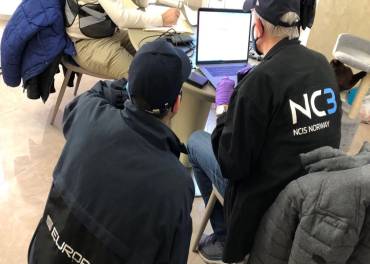Organ trafficking, or as it’s also known, Trafficking in Persons for Organ Removal, happens around the world, as evidenced by a ring recently discovered by the Pakistani police. Worldwide this is a USD $1.7 billion industry. Learn the facts about organ trafficking.
What is organ trafficking?
When a patient suffers from organ failure and all medical interventions have been explored, an organ transplant can be the only way to stay alive. This initiates a search for a compatible organ donor. Living donors are often family members or close friends. Organ donation can also come from a deceased person who has left documented consent to be an organ donor. In the process of such ethical organ donation, no one profits financially from the organ donation.
But the current global need for organs is far greater than the supply, according to Global Observatory on Donation and Transplantation, 2020. More than 150,000 transplants are performed annually worldwide, however, this is less than 10% of the global need. Some sick patients are willing to break the law and pay for an organ transplant, even if it involves exploiting vulnerable and impoverished people.
The terms “Organ Trafficking” and “Trafficking in Persons for Organ Removal” actually represent two very different crimes with distinct legal implications. “Organ Trafficking” refers to the illegal handling of organs. For example, selling an organ for profit or advertising the willingness to buy or sell an organ is organ trafficking.
“Trafficking in Persons for Organ Removal” is when a person of vulnerability is exploited, deceived, coerced, or abused for the illicit use of their organ. The organ doesn’t even have to be removed for this crime to take place, since it is the trafficking of the person that is the crime.
How prevalent is organ trafficking?
The organ trade, which includes illegal organ transplants, generates significant income, with conservative annual estimates between USD $840 million to USD $1.7 billion and 12,000 illegal transplants. About 10% of all transplants are believed to be illegal transplants.
Organ trafficking is far less common than labor or sex trafficking, partly because of the high level of medical knowledge and coordination necessary for the crime to take place. However, experts state that the magnitude of the problem is difficult to track since the crimes often happen within a network of legitimate medical settings with legally certified medical professionals.
“While trafficking in human beings for organ removal is not a new phenomenon, it is underreported due to the clandestine nature of the crime, combined with a lack of awareness by law enforcement agencies and the deficiency of information sharing channels between the medical and police sectors,” said Cyril Gout, INTERPOL’s Direct of Operational Support and Analysis.
We are just beginning to understand the scope of this crime as illustrated by the fact that the United States Department of Justice does not even include organ removal in its definition of human trafficking.
Who are the most common victims of Trafficking in Persons for Organ Removal?
Refugees, migrants, and asylum seekers are targets of traffickers as they may be desperate to provide for themselves and their families in their host country and willing to use an organ to pay a smuggler’s fee. According to the United Nations Office on Drugs and Crime (UNODC), the average victim is a young adult male, around 30 years old.
How are victims of organ trafficking recruited?
Donors are recruited online and in person. They are usually people who are vulnerable due to a lack of financial stability. They may be uneducated and told lies by traffickers that kidneys grow back, that they have three kidneys, or that they will be given medical care after the surgery. They are promised anywhere from $500 to $10,000 but may never be paid at all. They are sometimes forced to sign papers indicating valid consent or to declare that they are related to the patient.
In the case in Pakistan in January 2023, the victims were lured with promises of jobs and large payouts. Their kidneys were sold for up to the equivalent of USD $4,000.
Unfortunately, victims of Trafficking in Persons for Organ Removal can sometimes be mistaken as criminals because they are being paid. However, we need to consider what exactly makes someone a victim of human trafficking and what makes them a criminal. A victim of human trafficking is someone who is recruited, deceived, harbored, transported, coerced, and exploited.
One might think that if someone is paid for their organ, then they are profiting and therefore a part of the crime and not a victim of human trafficking, but if a donor was coerced and their vulnerability exploited, it would not be considered valid consent. The World Health Organization, among other authorities, actually requires a psychological evaluation to confirm that the donor is not financially profiting from or otherwise coerced into organ donation.
What can be done about organ trafficking?
Awareness-raising campaigns can make a difference to educate the general public and increase accountability among medical professionals. However, tracking the scale of the problem remains complicated. While other forms of human trafficking for sex or forced labor generally happen repeatedly over a period of time, human trafficking for organ removal only happens once, making it more difficult to track.
Those who have been trafficked for organ removal may remain silent because selling an organ has a stigma and is illegal. Therefore, the very person who has been exploited might fear being charged as a criminal. Confidentiality and patient privacy, while an essential component of professional medical care, can actually hinder legal investigations.
UPDATE ON ILLICIT TRADE IN HUMAN ORGANS
Cocaine Cartel
Cocaine cartel collapses after final arrests by the Spanish Civil Guard (Guardia Civil) and Europol in Spain The criminal network, with leaders...
Read morePreventing Fraud
Despite the devastating consequences of fraud, it can be prevented through several strategies and best practices. These include fortifying...
Read moreParis, Missouri Woman Arrested
PARIS, Mo. — A request for a bond reduction was denied Tuesday afternoon during a hearing for a former public administrator for Monroe County...
Read moreRansomware Attack
In a significant breakthrough in the fight against cybercrime, law enforcement from 10 countries have disrupted the criminal operation of the...
Read moreComprehensive Fraud Case Study and Prevention
In a world where financial transactions are increasingly complex and technology-driven, understanding the dangers of fraud and its consequences is...
Read moreLaundering Crypto
US arrests 2 Chinese for laundering $73M tied to crypto scams Cryptocurrency wallet involved in scheme received more than $341M in virtual assets...
Read moreThe Largest Bankruptcy in U.S. History Involving Over $60 Billion
The WorldCom debacle is another prime example of corporate fraud, with the telecommunications company inflating its assets by approximately $11...
Read moreEnd-To-End Encryption
European Police Chiefs said that the complementary partnership between law enforcement agencies and the technology industry is at risk due to...
Read morePhishing-as-a-Service Provider LabHost Disrupted
LabHost facilitated the phishing of users of hundreds of financial institutions worldwide for monthly subscription fee This week, law enforcement...
Read more








